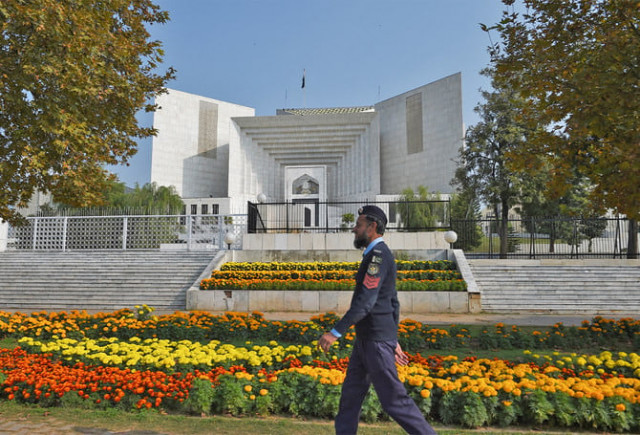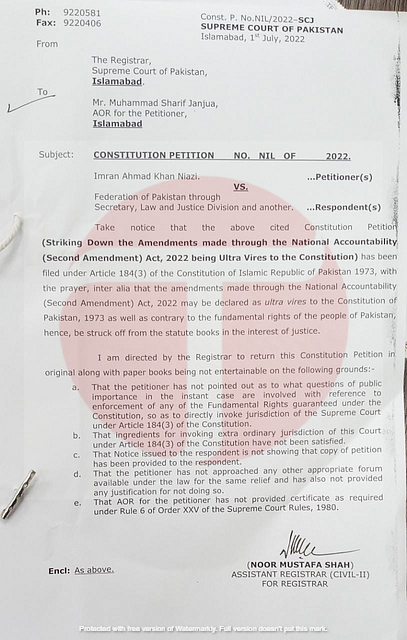SC registrar returns PTI plea against NAB law tweaks
Office says 'ingredients not satisfied' for moving SC under Article 184(3)

The Supreme Court registrar's office has refused to entertain Pakistan Tehreek-e-Insaf (PTI)
chairman and deposed premier Imran Khan’s petition wherein he had challenged the amendments to the country’s accountability law, raising five objections against it.
Ex-PM Imran had argued that tweaks to the ordinance would pave way for public office-holders to get away with white-collar crimes. The constitutional petition was filed under Article 184(3) through lawyer Khawaja Haris, the counsel for PML-N supremo and former premier Nawaz Sharif in the Panamagate case.
The apex court registrar's office in its objections on Friday stated that the petitioner had not highlighted what matters of public importance were involved in the enforcement of fundamental rights guaranteed under the Constitution so as to directly invoke the jurisdiction of the Supreme Court under Article 184(3).
“The ingredients for involving extraordinary jurisdiction of this court under Article 184(3) of the Constitution have not been satisfied,” a statement issued by the office read.
“That [the] Notice issued to the petitioner is not showing that copy of petition has been provided to the respondent,” it added.
The top court registrar’s office also objected that the petitioner had not approached the appropriate forum available under the law besides not providing any justification for not doing so.
It was further pointed out that the advocate-on-record (AOR) had not provided a certificate as required under Rule 6 of Order XXV of the Supreme Court Rules, 1980.
Read SC permits Punjab CM to hold office till July 22
The former premier had recently declared
his intention to challenge the amendments in the apex court and said they were tantamount to “legitimising” corruption.
Last month, the National Assembly and the Senate passed the Elections (Amendment) Bill 2022 and the National Accountability (Second Amendment) Bill 2021, with a view to bringing the necessary reforms the coalition parties had promised.
The government’s decision to steer the legislation into law was vehemently condemned by Imran, who had termed it a “black day” in the country’s history, charging the “imported government” with ending accountability. He had claimed that the ruling elite would reap the biggest fruits from the tweaks.
President Arif Alvi had also sent back the bills, following which the government convened a joint sitting of the NA and Senate, which approved them. The president had again refused to sign the amended bills, terming them "regressive" and had sent them back.
However, 10 days after a joint sitting passes a bill, it is considered law even if the president refuses to give assent.
The petition contended that most of the amendments were “person-specific” therefore the National Accountability Bureau (NAB) should be asked to provide details of all such cases which were related to prominent and influential holders of public office, especially about the cases pertaining to offences of owning assets beyond known sources of income and misuse of authority.
The petition also objected to the amendment, which restricted the NAB chairman to complete an inquiry within six months.
It questioned the substitution of Section 9 of the NAO wherein amendments had been made to the definition of benamidar, as well as the amendments relating to investigation of bank balance of an account holder.
“The court may very graciously be pleased to declare that amendments made by National Accountability Act 2002 in so far as they substitute section[s] 1(2), 2, 4, 5 (c) (e) (q) and (s), 6 (in so far as it empowers the government in place of the president as the appointing authority for the NAB chairman), Section 9 (a) (v), (vi), (ix), Section 10 (d), Section 18, proviso to sub section b of Section 25 and proviso in Section 26 and further substitute the word ‘National Assembly and the Senate' in place of president in section 23D and so far they omit Section 14, sub section b in the proviso to sub section (a) of Section 15, Clause (g) of Section 21 and Section 23 are ultra vires of the Constitution of Islamic Republic of Pakistan and violative of the fundamental rights of people of Pakistan as gauranteed by Article 9,14, 19A, 24 and 25 of [the] Constitution and direct that accordingly these amendments be struck off from statute books,” the plea read.




















COMMENTS
Comments are moderated and generally will be posted if they are on-topic and not abusive.
For more information, please see our Comments FAQ